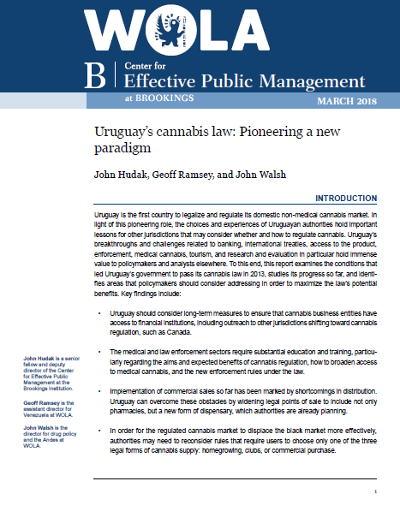Uruguay’s Cannabis Law
Pioneering a New Paradigm
March 2018
 Uruguay is the first country to legalize and regulate its domestic non-medical cannabis market. In light of this pioneering role, the choices and experiences of Uruguayan authorities hold important lessons for other jurisdictions that may consider whether and how to regulate cannabis. Uruguay’s breakthroughs and challenges related to banking, international treaties, access to the product, enforcement, medical cannabis, tourism, and research and evaluation in particular hold immense value to policymakers and analysts elsewhere. To this end, this report examines the conditions that led Uruguay’s government to pass its cannabis law in 2013, studies its progress so far, and identifies areas that policymakers should consider addressing in order to maximize the law’s potential benefits.
Uruguay is the first country to legalize and regulate its domestic non-medical cannabis market. In light of this pioneering role, the choices and experiences of Uruguayan authorities hold important lessons for other jurisdictions that may consider whether and how to regulate cannabis. Uruguay’s breakthroughs and challenges related to banking, international treaties, access to the product, enforcement, medical cannabis, tourism, and research and evaluation in particular hold immense value to policymakers and analysts elsewhere. To this end, this report examines the conditions that led Uruguay’s government to pass its cannabis law in 2013, studies its progress so far, and identifies areas that policymakers should consider addressing in order to maximize the law’s potential benefits.
![]() Download the report (PDF)
Download the report (PDF)
Key findings include:
- Uruguay should consider long-term measures to ensure that cannabis business entities have access to financial institutions, including outreach to other jurisdictions shifting toward cannabis regulation, such as Canada.
- The medical and law enforcement sectors require substantial education and training, particularly regarding the aims and expected benefits of cannabis regulation, how to broaden access to medical cannabis, and the new enforcement rules under the law.
- Implementation of commercial sales so far has been marked by shortcomings in distribution. Uruguay can overcome these obstacles by widening legal points of sale to include not only pharmacies, but a new form of dispensary, which authorities are already planning.
- In order for the regulated cannabis market to displace the black market more effectively, authorities may need to reconsider rules that require users to choose only one of the three legal forms of cannabis supply: homegrowing, clubs, or commercial purchase.
- Uruguayan authorities may also need to address a growing informal market by allowing legal sales to non-citizen tourists.
- In order to better position themselves to assess these adjustments, authorities should work closer with independent researchers and civil society to ensure that they have access to key information and institutional support for their work.







